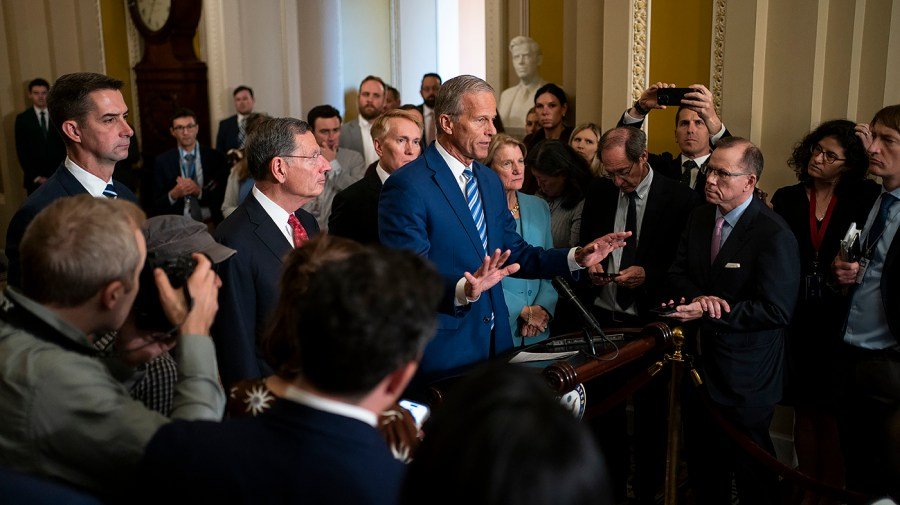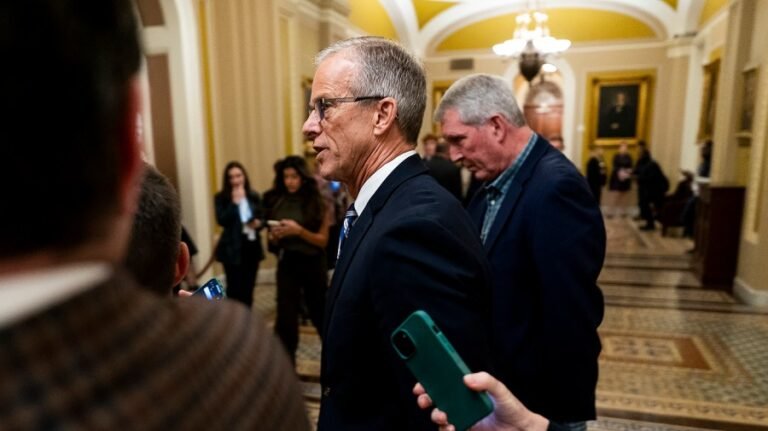
Senate Majority Leader John Thune (R-S.D.) and his Republican leadership team are scrambling for new ideas to end the 38-day government shutdown after it became clear Friday that tactics to pressure Democrats to vote for a House-passed funding bill have failed so far.
Senate Republicans are batting around various ideas to break the stalemate, such as voting on a new Senate-drafted bill that would fund a large swath of the federal government through fiscal year 2026.
This approach, championed by members of the Appropriations Committee, would entail voting on three regular appropriations bills that passed the Senate earlier this year with strong bipartisan support and which have been vetted with House Republicans.
Another idea, promoted by Sen. Lindsey Graham (R-S.C.), is to unveil a Republican-drafted bill that would seek to lower rising health care costs — tackling the issue at the center of the battle over government funding.
A third proposal, touted by Sen. Eric Schmitt (R-Mo.), is to encourage the Trump administration to raid federally funded projects in Democratic states such as California and New York to come up with additional funding to pay active-duty members of the military and air traffic controllers during the shutdown.
Senate Republican leaders are looking for new tactics to end the shutdown as rank-and-file GOP lawmakers tire of voting repeatedly on a House-passed clean continuing resolution to fund the government through Nov. 21.
Senate Democrats have blocked the House-passed bill 14 times, and Thune has been unable to increase the number of Democrats supporting the measures despite repeated entreaties to his colleagues.
“There’s no reason to vote on the same stuff that we voted in the past just to do it again,” Sen. Mike Rounds (R-S.D.) told reporters Friday.
So far, only three members of the Senate Democratic caucus have voted for a clean continuing resolution that doesn’t include language to extend the expiring Affordable Care Act (ACA) subsidies: Sens. John Fetterman (D-Pa.), Catherine Cortez Masto (D-Nev.) and Angus King (Maine), an independent who caucuses with the Democrats.
Senate Republicans on the Appropriations Committee led by Chair Susan Collins (R-Maine) have sought to break the deadlock by trying to entice Democrats to vote for a “mini-bus” appropriations package that would fund military construction, veterans’ affairs, the Department of Agriculture and the legislative branch for fiscal year 2026.
The chairs of the Senate and House Appropriations committees met Friday afternoon to put the finishing touches on the package in hopes that it could be swiftly approved in the House if it passes the Senate.
“From my vantage point, I still think it’s a viable option to get some of our fellow appropriators on the other side [of the aisle] to join us in voting for the CR by attaching the three-bill mini-bus and going to appropriations bills,” said Sen. John Hoeven (R-N.D.), a member of the Appropriations panel, who has been deeply involved in talks with Democratic centrists.
Hoeven acknowledged that Senate Democratic Leader Chuck Schumer (N.Y.) won’t agree to proceed with an appropriations package without an extension of the expiring health insurance subsidies.
“Leadership’s dug in and the American people are paying the price because of Schumer and the leadership, and evidently folks who want to run for president, using this as a leverage play,” he said. “I don’t know if their leadership ever comes around but I think there are practical Democrats that want to join with us.”
Thune told reporters Friday afternoon that he hoped to have the text of the revised appropriations package posted in time to act on it over the weekend. He added that it is unclear what the chamber will vote on over the weekend.
“We’re here and we’ll see if something comes together that we can vote on,” Thune said. “It remains to be seen.”
Schumer on Friday afternoon offered Republicans a counter-proposal to reopen the government that would include the GOP’s idea of attaching the minibus to a continuing resolution to fund the government until December or January.
But Schumer insisted that such a package needs to include a clean one-year extension of the ACA subsidies. To sweeten the offer for Republicans, the Democratic leader proposed establishing a bipartisan committee to negotiate long-term reforms to address health care affordability.
Thune and other Senate Republicans immediately dismissed it as a “nonstarter.”
“Everybody who follows this knows that’s a nonstarter,” Thune told reporters. “There is no way. The ObamaCare extension is the negotiation. That’s what we’re going to negotiate once the government opens up.”
Graham, the chairman of the Senate Budget Committee, slammed the proposed one-year extension of the subsidies as “terrible” and said that Republicans will soon unveil their own plan to curb rising insurance costs.
“We’re not going to continue for a year to load up insurance companies with taxpayer dollars to get an inferior outcome. Since 2010, the five largest health care insurance companies in the country, stock prices have soared,” he said. “Premiums, instead of going down for people, have gone up over 150 percent. There’s a better way to do it.”
Asked for what Republicans would do next after Democrats blocked a proposal to pay essential federal workers during the shutdown, Graham said his colleagues will look to play offense on health care.
“We’re putting together a proposal to show that we can get better outcomes than giving a bunch of money to insurance companies,” he said.
Schmitt, a Missouri Republican, says that Trump should move more aggressively to defund Democratic priorities, reflecting the growing frustration among Senate Republicans over the Democrats’ refusal to budge on a funding bill.
“The offer from Chuck Schumer and the Democrats is totally DOA,” he said, warning that the shutdown is starting to pose “serious air traffic problems” and “safety issues.”
“I am going to advocate with the administration … to go into California, to go into New York, every state by every Democrat who continues to shut the government down, find all the pet projects, find all the priorities, and take them away,” he said.
“We’ve got to pay people,” he said, citing air traffic controllers and Immigration Customs and Enforcement (ICE) agents.
He called Senate Democrats who have repeatedly blocked the House-passed funding bill “a bunch of kamikaze pilots trying to burn this whole place down.”
With the standstill ongoing, Senate GOP members are preparing to be in town for the foreseeable future until a deal is struck. One Senate Republican told The Hill that there was “unanimous support” among the conference for staying in town until a resolution is nailed down.
However, they are still smarting from what they viewed as an unforced error earlier in the week by Trump when he blamed the shutdown for the GOP’s poor electoral showing in numerous key races on Tuesday night — a move that buoyed Democrats at a key point in bipartisan negotiations.
“That was like — let’s take a couple of cans of gas a put it on the energy pile that Democrats are running with,” the GOP member said. “We’ve got to coordinate messages better.”
Democrats on Friday evening indicated that despite the GOP’s quick rejection, they are sticking with their proposal for the foreseeable future.
“We’re going to keep pushing this for a while,” Sen. Gary Peters (D-Mich.), who was a key figure in bipartisan discussions, told reporters.


